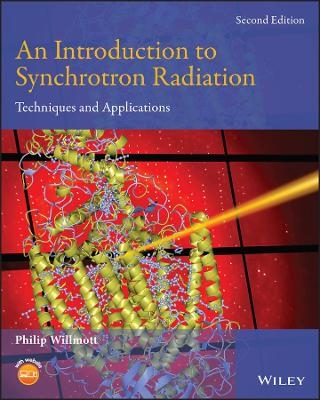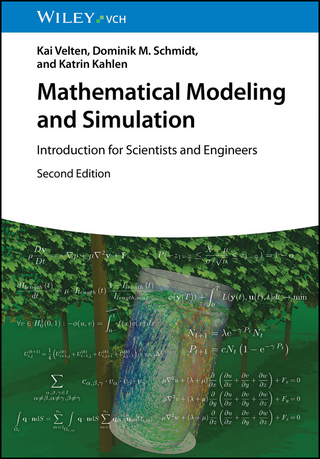
An Introduction to Synchrotron Radiation
John Wiley & Sons Inc (Verlag)
978-1-119-28039-2 (ISBN)
Synchrotron light is recognized as an invaluable research tool by a broad spectrum of scientists, ranging from physicists to biologists and archaeologists. The comprehensively revised second edition of An Introduction to Synchrotron Radiation offers a guide to the basic concepts of the generation and manipulation of synchrotron light, its interaction with matter and the application of synchrotron light in x-ray scattering, spectroscopy, and imaging.
The author, a noted expert in the field, reviews the fundamentals of important experimental methods, and explores the most recent technological advances in both the latest generation of x-ray sources and x-ray instrumentation. Designed to be an accessible resource, the book contains full-colour illustrations of the underlying physics and experimental applications, as well as the most commonly-used synchrotron techniques. In particular, the updated second edition now includes:
In-depth descriptions of the latest x-ray-source technologies, notably diffraction-limited storage rings and x-ray free-electron lasers
The latest advances in instrumentation, x-ray optics, and experimental methods in synchrotron radiation
The most recent developments in macromolecular crystallography, time-resolved studies, and imaging techniques
A comprehensive set of problems for each chapter, plus their ideal solutions in the appendices.
Written for undergraduate and postgraduate students from all areas of the natural and physical sciences, An Introduction to Synchrotron Radiation, Second Edition is an invaluable up-to-date reference source in this highly multidisciplinary field.
PowerPoint slides of all the figures within the text are available for download, for instructors and users of this book, at http://booksupport.wiley.com
Philip Willmott is the Project Leader of the upgrade to DLSR status of the Swiss Light Source at the Paul Scherrer Institute. He has taught elective courses in surface science and laser physics, and presently regularly offers introductory courses in synchrotron science and techniques, including, most recently, an online Massive Open Online Course (MOOC) based on the contents of this text. He is a titular professor in the Physics Institute of Zurich University and a physicist with over 25 years' experience in diverse aspects of experimental physics and materials science.
Preface xiii
Acknowledgements xv
About the Companion Website xvii
1 Introduction 1
1.1 A Potted History of X-rays 6
1.2 Synchrotron Sources over the Last Seventy Years 13
References 17
2 The Interaction of X-rays with Matter 19
2.1 Introduction 19
2.2 The Electromagnetic Spectrum 21
2.3 Compton Scattering 22
2.4 Thomson Scattering 25
2.5 Atomic Scattering Factors 26
2.5.1 Scattering from a Cloud of Free Electrons 26
2.5.2 Correction Terms for the Atomic Scattering Factor 28
2.6 The Refractive Index, Reflection, and Photoabsorption 32
2.6.1 The Refractive Index 32
2.6.2 Refraction and Reflection 33
2.6.3 Photoabsorption 38
2.7 X-ray Fluorescence and Auger Emission 42
2.7.1 X-ray Fluorescence 42
2.7.2 Auger Emission 45
2.7.3 Fluorescence or Auger? 45
2.8 Concluding Remarks 46
Problems 47
References 49
3 Synchrotron Physics 51
3.1 Introduction 51
3.2 Overview 51
3.3 Production of Light by Acceleration of Charged Particles 55
3.4 Forces Acting on a Charged Particle by Electromagnetic Radiation 57
3.5 Radiation from Relativistic Electrons 58
3.5.1 Synchrotron Radiation 58
3.5.2 Bremsstrahlung 62
3.5.3 Magnetic Deflection Fields 63
3.5.4 Radiated Power Loss in Synchrotrons 65
3.6 Radio-frequency Power Supply and Bunching 66
3.7 Photon-beam Properties 69
3.7.1 Flux and Brilliance 69
3.7.2 Emittance, Radiation Equilibrium, and Quantum Excitation 69
3.7.3 Coherence 73
3.7.4 Polarization of Synchrotron Radiation 76
3.8 The Magnet Lattice 77
3.8.1 Bending Magnets and Superbends 78
3.8.2 Betatron Oscillations and the Dynamic Aperture 80
3.8.3 Quadrupole and Sextupole Magnets 81
3.8.4 Orbit Control and Feedbacks 81
3.8.5 Multiple-bend Achromats and DLSRs 82
3.9 Insertion Devices 86
3.9.1 Wigglers 88
3.9.2 Damping Wigglers 89
3.9.3 Undulators 90
3.9.4 Undulators at DLSRs 97
3.9.5 Echo-enabled Harmonic Generation at DLSRs 99
3.9.6 Control of Polarization using Undulators 100
3.10 Concluding Remarks 101
Problems 103
References 105
4 Free-electron Lasers 107
4.1 Introduction 107
4.2 XFEL Architecture 110
4.3 The SASE Process 112
4.4 Properties of XFEL Beams 117
4.4.1 Tuning the Photon Energy 117
4.4.2 Source Fluctuations 117
4.4.3 Degree of Monochromacity 117
4.5 Seeding 118
4.5.1 High-brilliance SASE using an Array of Short Undulators and Chicanes 119
4.5.2 Self-seeding of Hard XFEL-radiation using Diamond Monochromatization 120
4.6 Radiation Damage and Heat Loads 120
4.6.1 Thermal Loads on Optics 121
4.6.2 Sample Irradiation 122
4.7 XFELs and THz Radiation 123
4.8 Concluding Remarks 124
Problems 124
References 126
5 Beamlines 129
5.1 Introduction 129
5.2 Front End 129
5.2.1 X-ray Beam-position Monitors 129
5.2.2 Primary Aperture and Front-end Slits 131
5.2.3 Low-energy Filters 131
5.3 Basics of X-ray Optics 132
5.3.1 Ray Optics 133
5.3.2 Spherical Surfaces and Aberrations 134
5.3.3 Wave Optics 137
5.4 Primary Optics 142
5.4.1 X-ray Mirrors 143
5.4.2 Monochromators 145
5.4.3 Higher Harmonics 155
5.4.4 Double-crystal Deflectors 158
5.5 Microfocus and Nanofocus Optics 159
5.5.1 Compound Refractive Lenses 160
5.5.2 Tapered Glass Capillaries 162
5.5.3 Fresnel Zone Plates 163
5.5.4 Multilayer Laue Lenses 166
5.6 Beam-intensity Monitors 167
5.7 Detectors 168
5.7.1 Sources of Noise in Detectors 168
5.7.2 Photographic Plates 170
5.7.3 Scintillator Detectors 171
5.7.4 The Point-spread Function 172
5.7.5 Crystal Analysers 172
5.7.6 Image Plates 175
5.7.7 Charge-coupled Devices 175
5.7.8 Pixel and Microstrip Detectors 176
5.7.9 To Integrate or to Count? 180
5.7.10 Energy-dispersive Detectors 181
5.8 Time-resolved Experiments 187
5.8.1 Streak Cameras 187
5.8.2 X-ray Streaking at XFELs 188
5.9 Concluding Remarks 189
Problems 189
References 192
6 Scattering Techniques 195
6.1 Introduction 195
6.2 Diffraction at Synchrotron Sources 197
6.3 Description of Crystals 198
6.3.1 Lattices and Bases 198
6.3.2 Crystal Planes 201
6.3.3 Labelling Crystallographic Planes and Axes 202
6.4 Basic Tenets of X-ray Diffraction 202
6.4.1 Introduction 202
6.4.2 The Bragg Law and Reciprocal Lattice 203
6.4.3 The Influence of the Basis 206
6.4.4 Dynamical Diffraction 209
6.5 Diffraction and the Convolution Theorem 210
6.5.1 The Convolution Theorem 210
6.5.2 Understanding the Structure Factor 212
6.6 The Phase Problem and Anomalous Diffraction 212
6.6.1 Introduction 212
6.6.2 The Patterson Map 214
6.6.3 Friedel’s Law and Bijvoet Mates 215
6.6.4 Anomalous Diffraction 216
6.6.5 Direct Methods 220
6.7 Types of Crystalline Samples 222
6.8 Single Crystal Diffraction 224
6.8.1 Laue Diffraction 224
6.8.2 Single Crystal Diffraction with Monochromatic X-rays 225
6.9 Textured Samples 227
6.10 Powder Diffraction 228
6.10.1 Introduction 228
6.10.2 Basics of Powder Diffraction 229
6.10.3 The Pair-distribution Function 231
6.11 Macromolecular Crystallography 232
6.11.1 Introduction 232
6.11.2 Geometries and Photon Energies used in MX 238
6.11.3 Opportunities for MX at DLSRs 240
6.11.4 Solving the Phase Problem in MX 242
6.11.5 MX Studies at XFELs 256
6.12 Surface Diffraction 258
6.12.1 Introduction 258
6.12.2 Crystal Truncation Rods 259
6.12.3 Superstructure Rods 262
6.12.4 Data Acquisition 262
6.13 Resonant X-ray Scattering 264
6.14 X-ray Reflectometry 267
6.14.1 Introduction 267
6.14.2 Reflection of X-rays and the Fresnel Equations 268
6.14.3 Thin Films and Multilayers 270
6.14.4 XRR Monitoring of Thin Film Growth 273
6.15 Small-angle X-ray Scattering 275
6.15.1 Introduction 275
6.15.2 Theory 276
6.15.3 Practical Considerations 288
6.15.4 Grazing Incidence SAXS 289
6.16 Concluding Remarks 290
Problems 291
References 297
7 Spectroscopic Techniques 303
7.1 Introduction 303
7.2 X-ray Absorption Processes 305
7.2.1 Energy-level Schemes of Atoms, Molecules, and Solids 307
7.2.2 Absorption Features 309
7.3 Photoelectron Energies, Wavelengths, and Absorption Regions 310
7.3.1 The Universal Curve 311
7.3.2 𝜎- and 𝜋-polarizations 312
7.4 X-ray Absorption Near-edge Structure, XANES 314
7.4.1 Introduction 314
7.4.2 The XANES Signal 315
7.5 Extended X-ray Absorption Fine Structure, EXAFS 318
7.5.1 Introduction 318
7.5.2 The EXAFS Signal 319
7.5.3 Time-resolved Absorption Spectroscopy 324
7.6 Fluorescence Spectroscopies 327
7.6.1 Introduction 327
7.6.2 X-ray Fluorescence 327
7.6.3 Resonant Inelastic X-ray Scattering 327
7.6.4 X-ray Standing Waves 331
7.7 Scanning Transmission X-ray Microscopy, STXM 333
7.7.1 Introduction 333
7.7.2 The Water Window 333
7.7.3 Modes in STXM 335
7.8 Photoemission Electron Microscopy, PEEM 335
7.8.1 Basics of PEEM 335
7.8.2 PEEM and Magnetic Dichroism 338
7.9 Photoemission Spectroscopy 341
7.9.1 Introduction 341
7.9.2 Ultraviolet Photoemission Spectroscopy 343
7.9.3 Soft X-ray ARPES 353
7.9.4 X-ray Photoelectron Spectroscopy 355
7.9.5 Hard X-ray Photoelectron Spectroscopy 358
7.10 Concluding Remarks 359
Problems 360
References 363
8 Imaging Techniques 367
8.1 Introduction 367
8.2 X-ray Computed Microtomography 368
8.2.1 Introduction 368
8.2.2 General Concepts 370
8.2.3 Practical Considerations 374
8.2.4 Phase-contrast Tomography 375
8.2.5 Fast XTM 383
8.2.6 Laminography 384
8.3 Full-field Microscopy 385
8.3.1 Zernike X-ray Microscopy 385
8.4 Lensless Imaging 387
8.4.1 Introduction 387
8.4.2 Speckle 389
8.4.3 Noncrystalline and Crystalline Samples 390
8.4.4 Oversampling and Redundancy 392
8.4.5 Ptychography 393
8.4.6 Scanning SAXS and Small-angle Scattering Tensor Tomography 395
8.4.7 X-ray Photon Correlation Spectroscopy 395
8.5 Concluding Remarks 397
Problems 398
References 400
Appendices
A Cryogenic Electron Microscopy 403
B Some Helpful Mathematical Relations and Approximations 409
C Fourier Series and Fourier Transforms Made Simple 411
C.1 Introductory Remarks 411
C.2 Periodic Functions 413
C.3 From Fourier Series to Fourier Transforms 415
C.4 Mathematical Properties of Fourier Transforms 417
D Argand Diagrams and the Complex Plane 419
E Solutions to Problems 423
E.2 Chapter 2 – The Interaction of X-rays with Matter 423
E.3 Chapter 3 – Synchrotron Physics 428
E.4 Chapter 4 – Free-electron Lasers 436
E.5 Chapter 5 – Beamlines 439
E.6 Chapter 6 – Scattering Techniques 446
E.7 Chapter 7 – Spectroscopic Techniques 459
E.8 Chapter 8 – Imaging Techniques 464
F Glossary 469
G Physical Constants Relevant to Synchrotron Radiation 473
Index 475
| Erscheinungsdatum | 24.04.2019 |
|---|---|
| Verlagsort | New York |
| Sprache | englisch |
| Maße | 203 x 254 mm |
| Gewicht | 1066 g |
| Themenwelt | Naturwissenschaften ► Chemie |
| Naturwissenschaften ► Physik / Astronomie | |
| Technik ► Maschinenbau | |
| ISBN-10 | 1-119-28039-7 / 1119280397 |
| ISBN-13 | 978-1-119-28039-2 / 9781119280392 |
| Zustand | Neuware |
| Haben Sie eine Frage zum Produkt? |
aus dem Bereich


